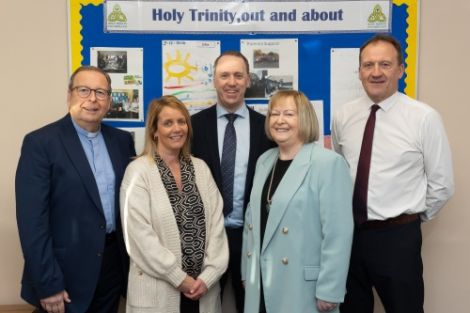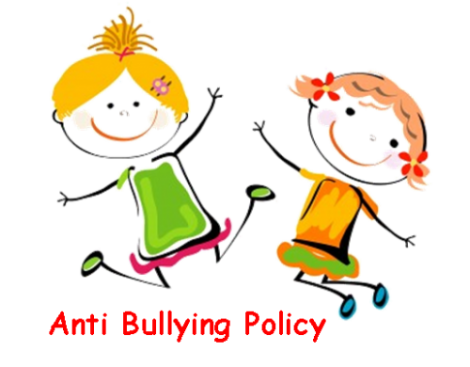Safeguarding Team

The Safeguarding Team is available for the protection and safety of children within the Holy Trinity school community. The team is available to parents, staff and children. If you have concerns about the safety, protection and/or care of a child from our school community please contact a member of our safeguarding team.
The Safeguarding Team are:
- Mr John Reihill (Designated Teacher)
- Mr Brian Treacy (Deputy Designated Teacher)
- Mrs Majella Jones (Deputy Designated Teacher)
- Reverend Martin Donnelly (Deacon) (Chair, Board of Governors)
- Mrs Martha Smyth (Board of Governors)
Children, ICT & e-Safety

Children, ICT & e-Safety
Information for parents and carers:
The purpose of this guide
Children of today are increasingly using Information & Communication Technology (ICT) in schools and in the home.
This guide explains:
- How your children are using ICT in school.
- How using ICT in the home can help children to learn.
- How children can use the Internet safely at home.
- Where to access further information
We are an inclusive Learning community striving to meet the needs of all
How your child uses ICT at school:
ICT in Holy Trinity is taught as a subject in its own right and also supports children’s learning in other subjects, including English and Numeracy.
Within ICT lessons children learn to use a wide range of software and electronic devices including:
- Word Processing to write stories, poems or letters;
- Databases to record information, e.g. minibeasts;
- Spreadsheets to create tables, charts and graphs;
- Desktop Publishing to design posters, leaflets or cards;
- Multimedia Presentation to present text, pictures, sound and video;
- Drawing Programs to create pictures and designs;
- Internet and CD-ROMs to find information;
- Email to contact children in another school;
- Digital Cameras to record what they have done in class or on a visit;
- Controllable Robots to give instructions and make something happen;
- Video Conferencing to share ideas or ask an expert.
Simple rules for keeping your child safe on the Internet at school and home
To keep your child safe they should:
- ask permission before using the Internet and discuss what websites they are using
- only use websites you have chosen together or a child friendly search engine
- only email people they know, (why not consider setting up an address book?)
- ask permission before opening an email sent by someone they don’t know
- not use their real name when using games or websites on the Internet, (create a nick name)
- never give out any personal information about themselves, friends or family online including home address, phone or mobile number
- never arrange to meet someone they have ‘met’ on the Internet.
- never tell someone they don’t know where they go to school or post any pictures of themselves in school uniform
- only use a webcam with people they know
- tell you immediately if they see anything they are unhappy with.
Children under 13 years of age are not permitted to use social networking sites such as Face book.
Using These Rules:
Go through these rules with your child and pin them up near to the computer. It is also a good idea to regularly check the Internet sites your child is visiting e.g. by clicking on History and Favourites. Please reassure your child that you want to keep them safe rather than take Internet access away from them.
Be SMART on line
S - Safe: Keep safe by never giving out personal information over the internet.
M - Meeting someone you have met online can be dangerous, always talk to an adult before you consider doing this.
A - Accepting emails, opening files or pictures from people you don’t know can lead to problems—they may contain viruses or nasty messages.
R - Reliable: Someone on the internet might lie about who they are and information on the internet may not be reliable
T - Tell your parent, teacher or trusted adult if someone or something on the internet makes you feel uncomfortable.
For further information go to:
CEOP: www.ceop.gov.uk
Think U Know: www.thinkuknow
Childnet: www.childnet-int.org
How learning at home with ICT benefits children
Home use of ICT by children:
- improves their ICT skills
- offers them choice in what they learn and how they learn it
- supports homework and revision
- improves the presentation of their work
- connects learning at school with learning at home
- makes learning more fun.
All this can lead to better performance at school and an improved standard of
work. For further information go to:
Parents Centre: www.parentscentre.gov.uk/usingcomputersandtheinternet
Information for parents and carers
Using the Internet safely at home
Whilst many Internet Service Providers offer filtering systems and tools to help you safeguard your child at home, it remains surprisingly easy for children to access inappropriate material including unsuitable text, pictures and movies.
Parents are advised to set the security levels within Internet Explorer or other browsers with this in mind. Locating the computer in a family area where possible, not a bedroom, will enable you to supervise your son or daughter as they use the Internet.
Also consider mobile phones and games consoles and other devices that can access the internet. However, don’t deny them the opportunity to learn from and enjoy the wide variety of material and games available on the Internet. Instead discuss with them some simple rules for keeping safe online and making sure they understand their importance.
Pastoral Care Child Protection

Keeping Children Safe: Safeguarding Information for Parents
An Inclusive Learning Community Striving to meet the needs of all
General Principles for Promoting Pastoral Care in Holy Trinity PS
Holy Trinity Primary School is committed to providing a safe, caring, challenging and stable environment for all our pupils.
We achieve this through a team approach involving parents, staff, therapists and other relevant professionals.
In promoting Pastoral Care the aims of the staff in Holy Trinity Primary School are to develop our pupils’
- Self esteem
- Confidence
- Assertiveness
- Communication Skills
- Sense of responsibility
- Respect for themselves and others
- Awareness of personal safety
- Experience of success
To support these aims the school has developed detailed Pastoral Care and Safeguarding policies to which all staff are committed and which are regularly reviewed and updated.
Safeguarding
Our Safeguarding Policy is designed to protect our pupils by ensuring among other things, that all staff are well informed about and have received training in safeguarding issues, are aware of their duty of care and their responsibility to report any concerns re Child Protection issues to the designated teacher ,Mr John Reihill, or deputies, Mr Brian Treacy or Mrs Majella Jones.
It should be noted that information given to members of staff about possible child abuse cannot be held “in confidence”. In the interests of the child, which are always paramount, staff may need to share this information with other professionals. However, only those who need to know will be told.
Parents
As a parent you are the most important person in keeping your child safe.
As a parent you should:
√ Talk to the school if you need help or support.
√ Feel confident about raising any concerns you have in relation to your child.
√ Read your school’s Pastoral Care, Anti Bullying, Positive Behaviour, E-Safety and Child Protection policies.
√ Inform the school if your child has any medical conditions or educational needs.
√ Make the school aware of any Court Orders relating to your protection or your child’s protection.
√ Inform the school if there is any change in your child’s circumstances for example; change of address, change of name, change of parental responsibility.
√ Parents of primary school children should tell the teacher if there are any changes to arrangements about who brings their child to and collects their child from school.
√ Contact the school if their child is absent, then ring or send in a note on the child’s return to school. This assures the school that you know about the absence.
Guidelines and Procedures
In all their contact with pupils, staff in Holy Trinity follow the guidelines and procedures described in the DENI publication 'Safeguarding and Child Protection in Schools’ 2017.
We believe that:
- Children should always be taken seriously.
- In any incident the child’s welfare must always be paramount.
- A proper balance must be struck between protecting children and respecting the needs of parents and families.
- The needs of children must always come first.
- Children with disabilities are children first and have equal rights to protection. However they may have particular needs that require specialist attention.
Procedure where Parents/Guardians have a concern:
- I have a concern about my/another child’s safety
- I can talk to the class teacher
- If I am still concerned, I can talk to the Designated Teacher For Child Protection– Mr Reihill or Assistant Designated Teachers, Mr B Treacy and Mrs M Jones.
- If I am still concerned, I can talk to the Principal, Mr B Treacy
- If I am still concerned, I can talk/write to the Chairperson of the Board of governors, Rev Martin Donnelly (Deacon) 02866322075
- If I am still concerned I can contact the NI Public Services Ombudsman. Tel 0800 343424
At any time I can talk to the Gateway Team Social Services 02871314090 or the PSNI;
- 101 for a Non emergency
- 999 for an emergency
This is a summary of the many aspects of Pastoral Care in Holy Trinity Primary School. Detailed copies of the Pastoral Care and any other policies mentioned are available from the school on request or on our website www.holytrinityps.com
Holy Trinity Primary School Behaviour Management, Anti Bullying and Complaints policy

Behaviour Management Policy
Holy Trinity Behaviour Management Policy is designed to create a common expectation of standards in behaviour, incorporating good manners and respect and to help all staff be consistent in the way we deal with unacceptable behaviour.
Behaviour is presented positively, concentrating on rewarding the good rather than punishing the unacceptable. As a Catholic school we believe that the essence of good behaviour is care and consideration for others. We expect high standards of behaviour and courtesy from our children at all times.
The Four levels of unacceptable behaviour
Level One: Misbehaviour that can be effectively managed within a classroom environment by the class teacher /classroom assistant.
Level Two: More serious behaviour that is not manageable within the classroom environment. Principal/vice principal involved and parents may be notified in writing or by phone call.
Level Three: Very serious misbehaviour or persistent level two behaviours. Formal involvement by the principal and parents. (Additionally other outside agencies may also become involved.)
Level Four: Where there is persistence of level 3 behaviours and the above interventions are not supporting the pupil adequately, further agency involvement may be deemed necessary. May lead to suspension or expulsion.
Our aims are:
- To create an environment where everyone is respected and cared for;
- To create an environment where everyone feels safe from the harm caused by inappropriate behavior;
- To create a forgiving ethos among all in the school;
- To create an environment where property is respected and treated with care.
- To create an understanding of personal discipline and for the children to understand why discipline is needed;
- For children to take personal responsibility for their actions;
Consequences of breaking a rule:
- Verbal warnings
- Time out from classroom /activity
- Withdrawal of privileges
- Break time/lunch time detention
- Referral to Head Teacher / Deputy Head
- Letter home /Parental meeting
- More serious behaviour that is not so easily managed within a classroom to be dealt with by principal with parents and possibly outside agencies.
Our Anti-bullying Policy
Bullying is the repeated use of power by one or more persons intentionally to hurt, harm or adversely affect the rights and needs of another or others.
Bullying is a highly damaging and distressing form of abuse and is not tolerated in Holy Trinity.
All staff are vigilant at all times to the possibility of bullying occurring, and will take immediate steps to stop it happening, to protect and reassure the targeted child and to discipline the child displaying bullying behaviour.
The parents of children involved will be contacted immediately bullying behaviour is identified.
We are a TELLING school.
This means that anyone who knows that bullying behaviours are happening is expected to tell a member of staff.
Procedures for Pupils / Parents
- Report bullying incidents to staff .
- The facts of the incidents will be clarified and recorded by staff / principal .
- In serious cases parents will be informed and will be asked to come in to a meeting to discuss the problem.
- The bullying behaviour or threats of bullying must be acted upon and the bullying stopped quickly.
- An attempt will be made to help the children change their behaviour and the situation closely monitored to ensure a repeat does not occur.
Our Anti-bullying Policy
Outcomes
- Help the targeted child to identify ways in which he/she may be strengthened and supported.
- If possible, the pupils will be reconciled.
- The school will look at solution focused interventions which help all.
- After an incident / incidents have occurred, the facts outlined clearly and the incident dealt with appropiately, each case will be monitored to ensure repeated bullying does not take place.
Working in Partnership with Parents/Carers
School staff will meet with parents on bullying issues as a result of:
- parents expressing a concern about their child being bullied
- an incident or concern from within school
Staff will:
- Ensure that all relevant facts are collected and clarified
- Share your concern about the bullied child
- Make it clear that you will act in accordance with the school’s anti-bullying policy
Handling Complaints In Holy Trinity
This policy is designed to establish a clear mechanism for the resolution of complaints which can be verbal, written or E-mailed. Our comments / complaints policy is outlined below.
Stage One
When making a complaint, contact the school principal who will arrange for the complaint to be investigated. If the complaint is about the principal, proceed to Stage Two. The school requires complaints to be made in writing. Where this may present difficulties, please contact the school which will make reasonable arrangements to support you with this process.
When writing your complaint, please provide clear information and include the following:
- Your name and contact details
- What your complaint is about – please try to be specific
- What you have already done to try to resolve it and
- What you would like the school to do to resolve your complaint
The principal will normally acknowledge the complaint as soon as possible but within 10 school working days. This will be a short response and you will be sent a copy of, (or a link to) the school’s complaints procedure. A final response will normally be made within 20 school working days of receipt of the complaint. This response will be issued in writing and will indicate with reasons whether the complaint has been upheld, partially upheld, or not upheld. If, for any reason, the consideration of a complaint takes longer to complete, you will be informed of revised time limits and kept updated on progress.
These timeframes may need to be reviewed if complaints are ongoing during school holiday periods.
If you remain unhappy with the outcome at Stage One, the complaint may be progressed to Stage Two which is overseen by the board of governors.
Stage Two
If your complaint is about the principal or if the complaint is unresolved after Stage One, write to the chairperson of the board of governors. Where this may present difficulties, please contact the school which will make reasonable arrangements to support you with this process. The letter can be left at the school office and marked ‘private and confidential’. The chairperson will convene a committee to consider the complaint.
In the case of the complaint being about the principal, this committee will investigate the complaint.
Please provide clear information and include the following:
- Reason(s) why you disagree with the stage one findings
- Any aspect in which you think that the school’s complaints procedure was not fully followed
The chairperson of the committee will normally acknowledge the complaint as soon as possible but at least within 10 school working days. A final response will normally made within 20 school working days from date of receipt of the second letter. The response will be issued by the chairperson of the committee and will indicate, with reasons, whether the complaint has been upheld, partially upheld or not upheld.
If, for any reason, the review of a complaint takes longer to complete, complainants will be informed of revised time limits and kept updated on progress.
These timeframes may need to be reviewed if complaints are ongoing during school holiday periods.
Northern Ireland Public Services Ombudsman (NIPSO) www.nipso.org.uk
If following Stage Two you remain dissatisfied with the outcome of your complaint, you can refer the matter to the Office of the Northern Ireland Public Services Ombudsman (NIPSO).
The Ombudsman provides a free, independent and impartial service for handling complaints about schools in Northern Ireland. You have the right to complain to the Ombudsman if you feel that you have been treated unfairly or have received a poor service from a school and your complaint has not been resolved to your satisfaction.
A complaint should normally be referred to NIPSO within six months of the final response from the school. The school must advise in its concluding letter that the complaint may be referred to the NIPSO if you remain dissatisfied.
APPEALS PROCESS
Written request to have case heard by full Board of Governors. Acknowledge Receipt (10 Working days)
Meet with complainant (30 Working days) Consider the issues Implement any agreements/ changes. Confirm outcomes in writing (40 working days). Confirm outcomes in writing (by the 40th working day)
If you remain dissatisfied with the outcome, you can refer the matter to The Office of the Northern Ireland Public Services Ombudsman (NIPSO).
Progressive House, 33 Wellington Place, Belfast, BT16HN.
Telephone:02890233821 Freephone:0800343424
Email: nispo@nispo.org.uk
web: www.nispo.org.uk
